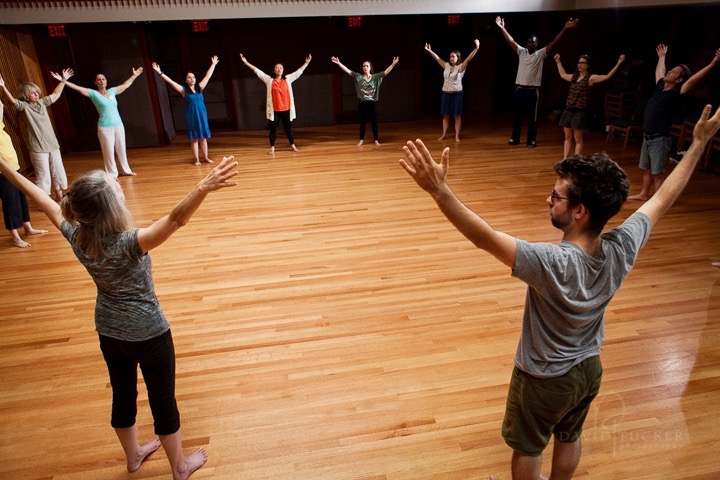
Looking at the Differently-Abled
In my last blog entry, I wrote about our recent online discussion on Dalcroze Eurhythmics with differently-abled bodies, and shared a couple of personal stories that arose, some from the perspective of a student with a disability, some from the perspective of a teacher working with students with disabilities. I also related my own story about dealing with hearing loss.
Since then, I have been thinking about how our Dalcroze training rooms are often full of very able, ambulating bi-peds with full hearing, full vision, two arms and two hands. This past summer, at the Dalcroze School of the Rockies/Dalcroze Academy, where I was teaching and learning, one of the trainees accidentally broke a finger on her dominant hand during a plastique animé class. She went to the Urgent Care clinic, received an x-ray and splint, then proceeded to attend the remaining week and a half of classes, adapting to eurhythmics, solfege and improvisation with one hand, and, for the most part, one arm.
The faculty and other trainees were helpful and supportive, providing her with suggestions for alternatives to clapping, tapping, patting and drumming. With her non-injured hand, she used a castanet. She could also tap her non-injured hand on other parts of her body or use this hand to clap or patsche with a partner.
Her newly limited movement vocabulary added yet another dimension to what she was already doing in Dalcroze level 2: listening, moving, analyzing, changing on a signal, responding to others, etc.
Then there was the pain. And the fear of intensifying pain from bumping into someone as the participants moved creatively throughout the space. She had to stabilize and inhibit the movement of her right arm which, of course, affected her range of motion, balance, flow/breath, use of space, awareness of others, etc.
It was an interesting paradox of sorts that her biggest concern, initially, was how breaking her right middle finger would affect her piano playing. But, being a pianist who had spent many hours playing the piano, her left hand did an amazing job maintaining both accompaniment and melody, and she passed the improvisation exam with aplomb!
Her eurhythmics exam was another story. She remarked that in order to keep her balance, without the essential contralateral counterbalance of her injured arm, she had to alter her steps; as she put it, she had to make a quick choice between stepping with musical, rhythmic accuracy or risk falling down. Perhaps, she reflected, if she had spent as many hours in movement and dance classes as she had in piano practicing, her body would have been much quicker to adapt. Also, because of the pain and her need to rest and elevate her hand at the end of the day, she did not practice for eurhythmics like she would have otherwise.
This was a time-limited, acute injury rather than an ongoing or lifelong disability. It is interesting to reflect on the challenges of both. Had the student been living without an arm or hand all of her life, her needs and adaptations would be very different.
To refer back to my hearing impairment, my biggest challenge in Dalcroze classes, as a teacher and as a student, is hearing the spoken words of others. Hearing the teacher’s instructions and cues clearly, so essential to the Dalcroze experience, is a challenge when the speaker is not facing me. I have to keep reminding myself that it is OK to speak up and ask for someone to repeat themselves, to face me when possible, and I am so very grateful to the folks who make this effort. I can tell that it requires another level of attention that is easier for some than for others. Again, differently-abled…
The alternative to speaking up and asking for accommodation is withdrawing from participation. I can really imagine how having a disability can spiral into withdrawing from activities, becoming isolated, feeling less-than and letting skills atrophy. It behooves us all to become more sensitive to the range of abilities and disabilities among us.
All are welcome to join our very relaxed and intimate monthly discussion on “Undoing Racism in Music Education.” We meet on Zoom on the last Sunday of each month, 10–11am EST. The meeting revolves around our own experiences as teachers, learners, administrators, performers, and other roles we play in our lives and how issues of diversity, equity and inclusion interface with these roles.
We have an extensive list of resources which can be accessed here:
CALL FOR FOLKS TO JOIN AFFINITY GROUP
The DSA Diversity, Equity and Inclusion committee is putting out a call for folks who are working with students with disabilities. We would like to form a peer group to share our ideas and resources. If you are interested, please send an email to dawn@dalcrozeusa.org.
In addition, the DEI committee is looking for new members. If you are interested, or have questions or comments about any of this, reach out to dawn@dalcrozeusa.org.